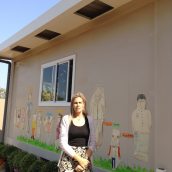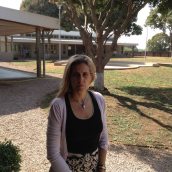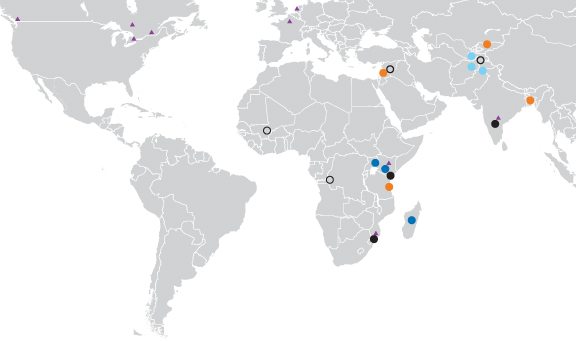
The Academies Network
The Aga Khan Academy Maputo is the third in a planned network of Aga Khan Academies being established in countries across Africa, South and Central Asia, Europe and the Middle East.
The aim of the Academies is to develop future leaders with the skills and knowledge to support positive development in their societies. We achieve this by recruiting exceptional young people from all backgrounds and providing them with the highest international standard of education.
Admission is means-blind and based on merit to ensure access for eligible students regardless of financial circumstances.
"...the Academies will be serious, focused, rigorous environments – but at the same time they will be spacious and joyous places. They will operate on the cutting edge of knowledge and pedagogy, but they will be rooted in history and steeped in tradition."
When complete, the network of Academies will form a global learning community of approximately 18 schools in 14 countries (map).
They will eventually serve approximately 14,000 girls and boys of exceptional calibre, graduating 1,500 students annually.
For more information, visit our Academies network home page.
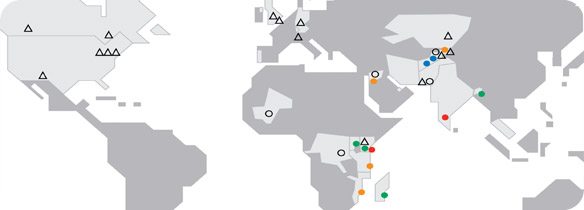
The Academies Network
The Aga Khan Academy, Dar-es-Salaam is the fourth in a planned network of Aga Khan Academies being established in countries across Africa, South and Central Asia, and the Middle East.
The aim of the Academies is to develop future leaders with the skills and knowledge to support positive development in their societies. We achieve this by recruiting exceptional young people from all backgrounds and providing them with the highest international standard of education.
Admission is means-blind and based on merit to ensure access for eligible students regardless of financial circumstances.
...the Academies will be serious, focused, rigorous environments—but at the same time they will be spacious and joyous places. They will operate on the cutting edge of knowledge and pedagogy, but they will be rooted in history and steeped in tradition.
When complete, the network of Academies will form a global learning community of approximately 18 schools in 14 countries (map).
They will eventually serve approximately 14,000 girls and boys of exceptional calibre, graduating 1,500 students annually.
For more information, visit our Academies network home page.
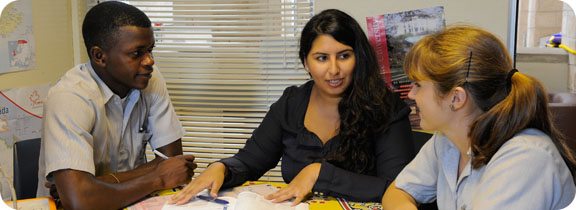
Teacher Professional Development
Promoting excellence in teaching, both on campus and more broadly, is a fundamental goal of the Aga Khan Academies. Each Academy has a Professional Development Centre (PDC), which strengthens the profession of teaching in the region by investing substantially in teachers’ professional development.
Developing strength in teaching
We identify and develop teachers of the highest quality who are committed both to the all-round development of young people and to their own professional growth as excellent teachers.
Our PDC supports excellence in teaching by promoting best practices in teaching and learning. We provide ongoing, collaborative training for Academy faculty as well as outreach programmes for teachers and head teachers from neighbouring government, private and not-for-profit schools. Our faculty members also have the opportunity to collaborate with colleagues across the globe and to teach abroad within the Aga Khan Academies network.
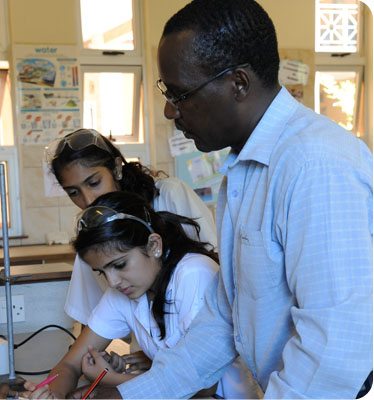 Outreach programmes
Outreach programmes
Our outreach progamming includes a course from the Professional Learning for Educators Series (PLES). The PLES programmes are designed by the Aga Khan Academies. They respond to the need to improve the standard of teaching and learning identified during extensive market research and interaction with government and departments of education.
The series includes programmes for teachers in various subject areas as well as specialised programmes focusing on skills and understandings related to education. We build professional competence by enhancing teachers’ subject knowledge and by examining how to teach that subject effectively. Each programme provides participants with a balance of intensive learning activities followed by an extended period of assisted application and observation within their own classrooms.
Strengthening curriculum and community
Through our professional development provision, we help create a professional community of competent, well-resourced teachers. These teachers will continue to support and collaborate with one another on materials development, by sharing best practices, and in establishing diverse academic, cultural and social projects.
Pamir - Roof of the World
Celebrate Navroz this Saturday from 7-9:30 pm in true Tajik style. Learn more about Tajik culture over a home-made dinner as you enjoy special performances.
Sandra Marise de Abreu Antunes: Motivating Students to Dream Big
“Teaching for me is to inspire students to build beautiful and magnificent magical castles. To me this is being a teacher,” she says enthusiastically.
For the two years that she has been at the Aga Khan Academy in Maputo, Mozambique, Sandra has focused her efforts on building a sense of cohesiveness, a sense of belonging in her classroom where her students feel safe to express their imaginings, their ideas and their thoughts.
“I always encourage my students to play together and share. In the classrooms, I take advantage of all the walls, to turn them into walls that speak, that reflect learning. Students' works are also displayed on these walls. These walls reflect colour and joy!”
Born in Angola and educated in her ancestral country of Portugal, Sandra holds a degree in teaching and a postgraduate degree in Information and Communication Technologies. In addition, she has more than 20 years of experience teaching at various schools in Portugal and Angola. She also worked as a Coordinator of School Libraries in Sao João da Madeira in Portugal, for which she received an award from the country’s Ministry of Education.
Asked who it was who influenced her in her journey toward teaching, Sandra does not waver in her response.
“It was my mom,” she says decisively. “I think what influenced me to go into teaching was the fact that my mom always encouraged me to pursue this career. At the time when she was young, she could not study because her father did not let her. She dearly wanted to be a teacher.”
What drew Sandra to apply to teach at the Academy? She says it is the serious commitment the school has towards its students and teachers alike and the lofty goals it has set for itself. She particularly values the emphasis the Academy places on the professional development of its teachers.“For me it is with great honour and pride that I teach at the Academy. I believe in the vision of His Highness the Aga Khan and the honourable purpose of the Academies. Another trait that is distinctive to the school is its teacher education/development programme. It is dynamic.”
Sandra also feels that the Academies’ adoption of the International Baccalaureate (IB) programme was an “excellent choice” because of its unique educational approach. Although the IB curriculum was a challenge to her initially, she enjoyed the challenge.
Sandra is careful to inculcate various strands of the Academy’s curriculum in her teaching, including diversity.
“In my classes I always try to adopt strategies and measures that promote respect, and acceptance of the differences of all of the students. The teacher who builds an environment that upholds equality in the classroom is a reflective teacher.”
“I am committed to the multicultural approach to ensure the highest sensitivity to diversity. It is essential that teachers understand students and their families from different regions of the country and even from abroad, so that they can respect the diversity of languages, behaviours, religions and ways of life, and be able to manage conflicts. In my classes I always give the students real‐world experience so that students develop empathy and tolerance.”
To Sandra, “trust, friendship, solidarity and mutual respect” are of paramount importance in a teacher-student relationship. To build this kind of relationship requires hard work, she says.
“For me being a teacher is not a simple task, rather it is a task that requires love and skill. In my view, the teacher is not simply one who transmits knowledge. The teacher's role is much broader. It surpasses mere transmission of knowledge.”In addition to teaching at the school, Sandra is also involved with the Mozambique Professional Development Center (PDC), an outreach component of the Academy. A major objective of the PDC is to provide high quality professional development programmes for local teachers and pedagogical leaders from a network of selected primary schools in the country. Along with other external facilitators, Sandra is currently aiding in the Early Reading and Writing course. The other two PDC programmes include a Certificate Course in Educational Leadership and Management and Early Numeracy and Geometry.
Reflecting on her time at the Academy, Sandra states that all her days at the Academy are “pleasurable.” However, the one day that will always remain her memory was the time she visited the Academy site while it was still under construction. She felt a sense of belonging, a sense of connectedness then, she states.
By Perviz Walji
For newsletter readers, click here to return to the newsletter
Samantha Caras: Pioneering new approaches to University Counselling
Samantha Caras is from Southern California in the United States and has worked as a University Counsellor at the Aga Khan Academy Mombasa for four years. Her budding journey first began in India where she worked as an Academy Fellow for a year at the Aga Khan Academy Hyderabad supporting the leadership curriculum, helping out with college essay writing and teaching yoga before embarking on her role as a University Counsellor.
During her five years with the Academies, Samantha said her work changed the trajectory of her professional and personal life.
“It showed me that small opportunities, like being sent to a conference can change the course of your life,” Samantha said.
After being mentored in AKA Hyderabad, Samantha set out on a whirlwind experience at AKA Mombasa as a full-time University Counsellor.
“Coming to Mombasa has been exciting because I was able to have a lot of ownership over my work and could structure the office however I wanted,” Samantha said. “The flexibility and creative license I was given allowed me to build and restructure the university counselling programme to fit the diverse needs of our students.” She also said she enjoyed being immersed in many cultures, owing to the diversity of the school, and making friends from all over the world has helped her gain an overseas family for life.
Samantha said what she will miss the most is working closely with the students on their essays, being a part of High-achieving, Low-income (HALI) Access Network (an association of non-profit organisations in Africa that work with high-achieving, low-income students to access international higher education opportunities) and living in beautiful Mombasa. She also said she’s learnt quite a lot professionally, especially about the role of culture and background in higher-education advising.
During her time and position at the Academy, Samantha achieved quite a lot. On a personal level, she managed to finish her Master of Education in International Counselling Psychology, after which she got Minal Shah, the head of student support and well-being, to help her out with a professional internship. For the University Counselling office, Samantha managed to change the structure of the programme to include weekly lessons on topics such as writing a resume; professional communication; writing college essays; mock admissions game; applying for financial aid and scholarships; money matters; budgeting and cost of living abroad; adjusting to life after the Academy; and developed the presentations for these lessons. She also applied for the Academy to become a member of the HALI Access Network, which has increased its visibility and given it access to numerous resources and scholarship opportunities for the Talent Identification programme students over the past four years. Additionally, she contributed to the early drafts of what is now the University Counselling Handbook for the Academies network, set up the office’s social media page on Facebook, and worked with USA-based Ismaili volunteers to develop a sustainable standardised assessment test (SAT) programme for college admissions.
Minal describes Samantha as a warm, open and candid individual who worked well with the students.
“Samantha has built significant bonds with the students she’s worked with,” Minal said. “She always encouraged and pushed the students, who always appreciated her patience, honesty and sense of humour. I will miss working with her and her enthusiasm of making things right for the students. She will be a wonderful addition to any institution she joins.”
For her next plans, Samantha said she will be moving to Quito, Ecuador to work as the college counsellor at an international school.
“It was a difficult decision to leave Mombasa and the Academies, but I am excited for the new experience and to work on my Spanish language skills again,” Samantha said.
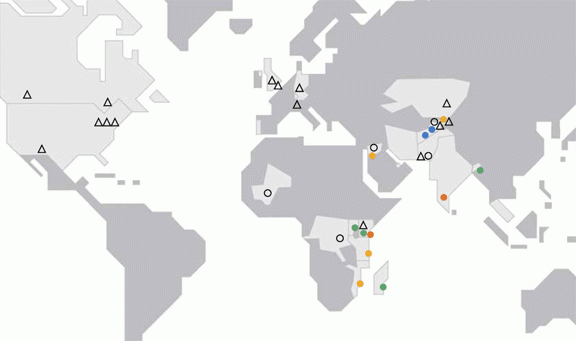
The Academies Network
The Aga Khan Academy Dhaka is the fourth of a planned network of Aga Khan Academies being established in countries across Africa, South and Central Asia, and the Middle East.
The aim of the Academies is to develop future leaders with the skills and knowledge to support positive development in their societies. We achieve this by recruiting exceptional young people from all backgrounds and providing them with the highest international standard of education.
Selection is means-blind and competitive, based on student merit. Students of all backgrounds who satisfy the requirements for entry are encouraged to apply.
When complete, the network of Academies will form a global learning community of approximately 18 schools in 14 countries (map). They will eventually serve approximately 14,000 girls and boys of exceptional calibre, graduating 1,500 students annually.
For more information, visit our Academies network home page.
News
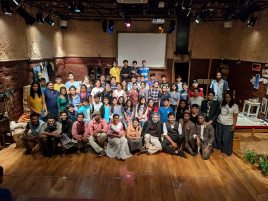
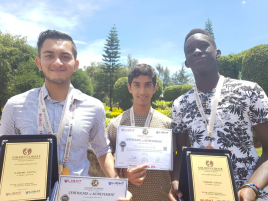
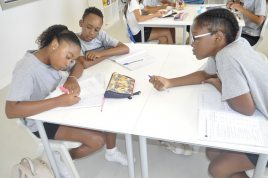
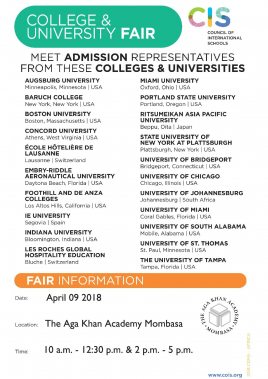
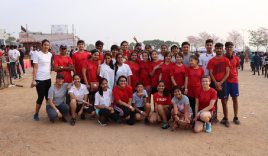
Pages
News





Pages
AKA Alumni - Mentor Application
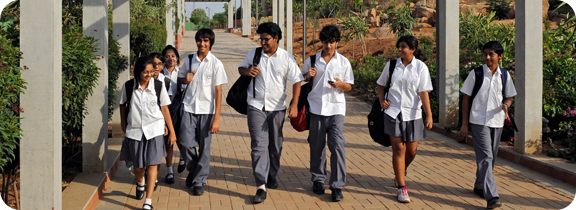
Please fill out the questionnaire below, giving as much detail as you can. If you have any questions, do not hesitate to contact us at: alumni@agakhanacademies.org

